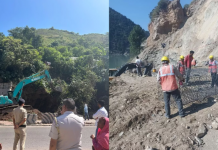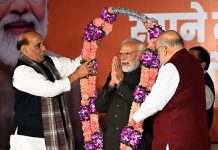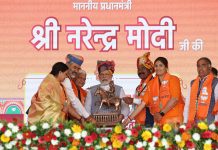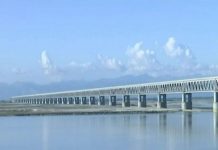 There is a buzz in the corridors of power that the BJP is of the firm view that by holding Lok Sabha and Vidhan Sabha elections together, the party can reap benefits of its sway in the State Assembly elections too. The party leaders are of the opinion that in the event of Assembly and General elections coinciding with each other, national issues take precedence over State issues and that can help the party perform better in the states going to the polls. The overwhelming view is that national issues would overshadow the anti-incumbency factor that is being witnessed in a couple of states. Luckily for BJP, there is no major issue before the Opposition on which it can take on the party in power. Madhya Pradesh, Rajasthan and Chhattisgarh State Assembly elections are due in November-December 2018 and these states can send proposals to hold elections alongside the general election if the latter is preponed to 2018.
There is a buzz in the corridors of power that the BJP is of the firm view that by holding Lok Sabha and Vidhan Sabha elections together, the party can reap benefits of its sway in the State Assembly elections too. The party leaders are of the opinion that in the event of Assembly and General elections coinciding with each other, national issues take precedence over State issues and that can help the party perform better in the states going to the polls. The overwhelming view is that national issues would overshadow the anti-incumbency factor that is being witnessed in a couple of states. Luckily for BJP, there is no major issue before the Opposition on which it can take on the party in power. Madhya Pradesh, Rajasthan and Chhattisgarh State Assembly elections are due in November-December 2018 and these states can send proposals to hold elections alongside the general election if the latter is preponed to 2018.
CMs meet Modi, Shah
Sources in the party told Tehelka that 13 chief ministers and six deputy chief ministers from BJP-ruled states have had a meeting with Modi and Shah recently. The conclusion that emerged from the meeting was that Modi still remains an undisputed leader and no opponent can match his towering personality. Despite some major decisions, the personal popularity of the PM was still intact. Another view that emerged from the meeting was that the party should prefer to sacrifice the remaining 10 to 12 months of power till the scheduled dates in 2019, to tilt the balance and clinch power for another five years. It is in this context that the way party chief Shah is consolidating BJP at the grass root level, it seems that the party is gearing up for an early General election.
Zero Income Tax
Political analysts believe that the BJP’s win in Uttar Pradesh was largely due to the effect of demonetization that the party was able to market perfectly in the poll-bound State. The party was victorious in 73 out of 80 seats. This time it is considering a much bigger shocker. Sources confided that the BJP is toying with the idea to altogether abolish Income Tax and come out with a flat Banking Transaction Tax (BTT).
It might sound surprising, but there are countries where people do not pay Income Tax. These countries include UAE, Qatar, Oman, Kuwait, Cayman Islands, Bahrain, Bermuda, The Bahamas, Saudi Arabia, Brunei Darussalam, as per KPMG’s 2012 survey of 114 countries. People in these countries, however, do need to contribute towards social security. Most of these countries have managed to use natural resources to fund government expenses. Zero Income Tax may sound utopian but it can again be a game changer for the BJP just as demonetization proved to be in Uttar Pradesh. The Government may come out with Consumption Tax or Expenditure Tax. It is quite like Income Tax, with one basic difference being that the tax is levied on expenditure and not on income. The view is that it encourages consumption.
In our country, Income Tax is largely a tax on the middle class salary earner. The poor hardly pay any income tax. The revelation by Finance Minister Arun Jaitley in his last Budget speech that only about 42,800 people had declared taxable income of over 1 crore annually came as a shocker to many in a country of 120 crore people. This makes a strong case for doing away with Income Tax. Why coerce only a particular section to pay Income Tax? If the BJP’s core-thinking groups are to be believed, the party is planning to pursue this idea vigorously.
Game changer UBI
The idea of universal basic income (UBI) could become a reality before the election is announced. The basic premise of UBI is that in a modern civilised society it is unacceptable that a person is unable to fulfil his basic needs simply because he cannot find a job. It would be a major attack on the issues of poverty and inequality. A periodical transfer of basic income close to or equal to the poverty line has the potential to lift 375 million poor Indians out of poverty in one stroke and keep them there. The benefits of UBI are aplenty and even go along with the political narrative of the government to combat corruption and ensure “minimum government, maximum governance”. A lot of recent debates have been around the ways and means in which the government can fund the scheme.
Slew of pro-poor schemes
The announcement of a slew of new schemes targeted at the middle class, farmers, poor and marginalized is an indication of things to come. The relief in the Goods and Services Tax, bringing down GST rates on 27 items, is aimed at silencing government critics. It is learnt that the Finance Ministry has sent a circular to all government departments to come out with draft proposals to launch new welfare schemes for poor. The launch of 16,000 crore scheme, Saubhagya, under which all households across the country will have access to electricity is one such scheme. Under this scheme power connections with be provided to the poor free of cost.
“Under the PM Sahaj Bijli Har Ghar Yojana, or Saubhagya scheme, every household in the country will be given an electricity connection. No price will be charged for the poor to get an electricity connection and the government will go to their houses to give them the connection,” Modi had announced on September 25.
The government will bear the expected 16,000 crore cost of giving electricity connections to four crore households in the country. The Prime Minister regretted that these households are yet to get electricity and haven’t seen a light bulb. “It’s been over 125 years when the famous scientist Thomas Alva Edison invented the bulb and who had said: ‘We will make electricity so cheap that only the rich will burn candles,” the PM stressed, highlighting that it is unfortunate that many households are still lit with the help of candles or lanterns. “Forgot about conveniences, even the women of the house have to cook in the dark, which is why most of them are under pressure to try and finish the cooking before sunset,” Modi said after inaugurating the Deen Dayal Urja Bhavan, a new green building built by public sector oil explorer ONGC in the capital.
 Arguing that few would have imagined a government will come that will give bank accounts to 30 crore poor people, insure 15 crore people at a cost of 90 paise per day, reduce the prices of stents and knee replacements, the PM said the dreams of the poor are the dreams of his government. “Did anyone ever think such a government would come that thinks of freeing women from smoke in the kitchens, did they imagine a government would think of enabling those who wear Hawai chappals to ride on an aeroplane?… Reducing the problems faced by the poor, the troubles they face in their daily lives is my government’s biggest responsibility,” the PM asserted.
Arguing that few would have imagined a government will come that will give bank accounts to 30 crore poor people, insure 15 crore people at a cost of 90 paise per day, reduce the prices of stents and knee replacements, the PM said the dreams of the poor are the dreams of his government. “Did anyone ever think such a government would come that thinks of freeing women from smoke in the kitchens, did they imagine a government would think of enabling those who wear Hawai chappals to ride on an aeroplane?… Reducing the problems faced by the poor, the troubles they face in their daily lives is my government’s biggest responsibility,” the PM asserted.
Maintaining the Prime Minister’s assertions, BJP President Amit Shah had commented, “As part of government’s effort to fund the unfunded, more than 7.45 crore entrepreneurs have been given bank loans worth 3.17 lakh crores under Pradhan Mantri Mudra Yojana. Of this, 70 per cent of beneficiaries are women.
Under the Mudra Yojana, a loan of up to 50,000 is given under the ‘Shishu’ plan, between 50,000 to 5 lakh under ‘Kishore’, and between 5 lakh to 10 lakh under ‘Tarun’. Banks have sanctioned more than 22,000 applications worth 4,699 crore under ‘Stand Up India’,” he claimed.
Election Commission prepared
The Election Commission of India earlier this week said that it will be logistically in a position to hold simultaneous polls to the State Assemblies and the Lok Sabha by September 2018. Election Commissioner O P Rawat, who was in Bhopal for the launch of the ERONet software that will check inaccuracies and duplicity in voters’ lists, said that the government had sought the commission’s response on the possibility of holding simultaneous state and national polls. The Election Commission has informed the government that funds to the tune of 3,400 crore and 12,000 crore would be needed for the requisite number of Electronic Voting Machines (EVMs) and Voter Verifiable Paper Audit Trail (VVPAT) machines respectively. Rawat said orders had been placed with two government undertakings and the
delivery of machines had already begun. All these machines are likely to be delivered by September 2018 after which the Election Commission would be in a position to hold polls to both state Assemblies and Lok Sabha.
Feasibility of synchronised polls
The BJP has been talking about the possibility of holding simultaneous elections to the state Assemblies and the Lower House of Parliament ever since it came to power at the Centre over three years ago. The party has been claiming that in doing so it is motivated by the need to save the country’s resources. The demand to hold concurrent polls was also raised a few years ago by senior BJP leader L K Advani, who has now been moved to the party’s periphery as a ‘margdarshak’. The National Institution for Transforming India or Niti Aayog, chaired by Prime Minister Narendra Modi, had also said in August this year that it was in favour of holding simultaneous state and central legislative polls in the country from 2024, calling it a move in “national interest” to put the least strain on the country’s resources.
Significantly, Vice-President Venkaiah Naidu has also supported the idea. It is true that holding elections in the country is an enormous exercise that puts excessive pressure on the public exchequer. While almost all parties flout caps put on election expenses to be incurred by them, the ruling parties often use money from the state treasury to fund populist measures to ensure their win in the event of an upcoming election. Government works come to a halt once the code of conduct comes into effect in the event of an imminent election, bringing the economy to a standstill. Moreover, a large number of manpower in terms of election officials and security personnel is needed to hold an election.
Will holding simultaneous elections solve the many problems of wasteful poll expenses being incurred especially by the state treasury? There cannot be a clear answer to this question. Mandatory inflation makes it tedious to compare calculated costs of subsequent elections held at gaps of a few years. For instance, the Niti Aayog in a discussion paper titled Analysis of Simultaneous Elections: The “What, “Why” and “How” prepared by Bibek Debroy and Kishore Desai said that the 2009 Lok Sabha election cost around 1,115 crore while the 2014 election cost 3,870 crore; which means that the official cost of holding a General election more than tripled in five years. The paper states that the expense of holding various state election in between was additional and cites a Election Commission estimate of an expense of around 4,500 crore to hold both state and central elections together. However, this figure of4,500 crore is also bound to increase with every subsequent simultaneous poll. Though there will be some relief to the national treasury in terms of election expenses being reduced, there will be some mandatory additional costs such as the thousands of crores being borne by the nation’s treasury to procure forty lakh machines to facilitate the mammoth process of simultaneous polling.
Some questions remain
Questions arising out of the switch in the country’s electoral practices go much beyond economics.
Questions arising out of the switch in the country’s electoral practices go much beyond economics. While next year elections to only a few state Assemblies are likely to be held concurrently with the General election, the long-term plan is to make it a practice to hold all state legislative polls and the central one together, as has been suggested by the Niti Aayog. However, simultaneous elections might give undue advantage to a single political party in a particular state that might be victorious in both the Assembly as well as General polls held concurrently. For instance, Assembly elections in Odisha and Andhra Pradesh were held simultaneously with the Lok Sabha election in 2014. In both states, the same parties emerged victorious in both elections.
In Odisha, the Biju Janata Dal (BJD) secured the maximum number of seats — 117 out of total 144 in the state legislative assembly and 20 out of total 21 in the Lok Sabha. In newly-bifurcated Andhra Pradesh, the Telugu Desam Party (TDP) emerged victorious in both synchronised polls by winning 106 out of 117 seats (along with ally BJP) in the Assembly and 16 out of total 25 parliamentary seats.
It’s worth mentioning that federalism is a key feature of the Indian Constitution. By introducing a one nation, one poll system on the lines of a Presidential system of polling, our federal system could be turned unitary in nature which is against the core principles of the Constitution. Imposing a single poll system on the people could also be a hindrance in the free political development of the Centre and the states. Big national issues will become the dominant themes of elections and the issues concerning the states and smaller constituencies will get a backseat which will be a drawback for small and regional political parties. India is a diverse country and every region has its distinct issues. Regional issues will receive a major setback if concurrent elections are enforced.
If we go back to the early elections in India, we find that elections to the Lok Sabha and State Assemblies were synchronised after independence in 1952, 1957, 1962 and 1967. Thereafter, the system got disrupted because of reasons such as unstable governments, coalition politics, imposition of President’s Rule. The possibility of such disruptions in governments will be there in the future too and the cycle of simultaneous state and central polls is bound to break. How will a solution be found to this pertinent problem?
As per the law, Lok Sabha election can be held six months prior to the scheduled dates and there is no need to make any Constitutional amendment regarding the same.
The BJP under the leadership of PM Modi and party President Shah has already started working towards the Lok Sabha poll and it is expected that an announcement for preponing the General election could be made after the
Gujarat Assembly election scheduled to be held later this year. However, to enforce the decision the BJP will need to take into confidence Opposition parties. Though that seems to be a tough task, who knows what the spinmeisters will now achieve.
letters@tehelka.com












